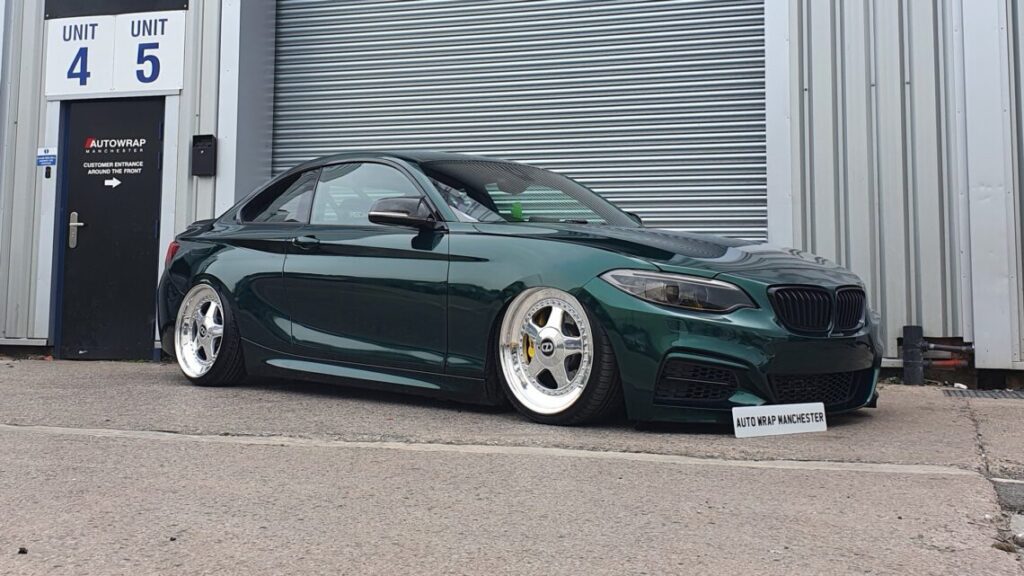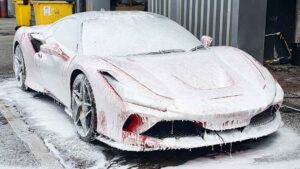What types of vehicle wrapping vinyl are there?
There are two types of vinyl film for vehicle wrapping, Cast Films and Calendered Films.
Most vinyl is made from a simple plastic polymer, polyvinyl chloride (PVC). Other ingredients are then added to the PVC by nature, it is relatively rigid. When mixed with other ingredients it can become flexible, colours can be added, and properties such as UV protection can be added. Heat stabilizers, fillers and processing aids can also be added to allow the film to be worked with.

What are Cast Films?
Cast Film is the end resulting product that has been made by mixing and baking a list of ingredients. The mixture is churned into a consistent mixture. In this liquid mixture, known as organosol, the resins such as polyvinyl chloride (PVC) are suspended or dispersed suspended in an organic fluid.
These coatings are not dissolved in the organic fluid but rather suspended in it. The dispersion technique is helpful because it allows the organosol coatings consisting of higher molecular weight insoluble resins to be used without using expensive solvents.
The casting manufacturing process involves the liquid mixture being poured at a specific gauge of thickness onto what is called a moving carrier web. This produces a thin gauge film-usually 1 to 2 mil thick.
The casting sheet then goes through a series of ovens which allows for the evaporation of solvents. When the solvents are evaporated, a solid “film” is left behind.
This film ends up in a relaxed state and gets windup onto a roll. These films are ideal for complex surfaces such as vehicles as the resulting outcome is a durable, flexible, conformable and dimensionally stable film that retains colour with a smooth finish.
What are Calendered Films?
Calendered films are similar to cast films as they are both made by mixing chemicals. However, once it is mixed it is rolled out into pie dough and kneaded. It is then put through a process called ‘calendering’. This involves passing through a series of heated steel rollers which form the vinyl into a thin sheet.
Calendered films often come with short-term warranties. These films are well suited for flat and simple curved applications are they typically have a less dimensionally stable state. And are less conformable with a tendency to shrink when exposed to heat.

What Types of Vinyl Vehicle Wraps Are There?
Choosing to wrap your vehicle can be a cost-effective way of changing the colour rather than respraying. If you wanted to freshen things up and save some money, why not look into the following types of vinyl that are available:
Glossy
Matte
Satin
Brushed
Glossy wraps
Just like the original paintwork of vehicle paint, a gloss vinyl can give the same look like a paint finish that has come straight out of the factory.

Matte wraps
A Matte finish is very much like a none shiny and flat coating because they have no sheen to them. It’s ideal for those looking for that stealth look. One that absorbs the light and doesn’t reflect as much of the light compared to gloss…

Satin Wraps
Satin wraps are very unique as they offer a semi-matte and sleek design. Its subtle metallic shine provides a professional look to your car.

Brushed Car Wraps
When wanting that brushed aluminium look with a realistic textured this wrap option could be for you. The features are that it doesn’t have a high reflection and it gives a very realistic textured look. So if you are after a modern and premium look then this could be the option for you and your vehicle.

So what exactly Are Vehicle Wraps Made Of?
As mentioned cast films and calendar films are made from a mixture of ingredients such as PVC, colour pigments and various chemicals that are baked and then put through a moving carrier web and onto a roll. The backing of the vinyl has an adhesive backing that sticks to the vehicle that is being applied.
In Summary
Each vehicle is different with its own complexities so there are going to be various challenges when fitting the vinyl. It is important that the vehicle is delivered to us in the best possible condition. It is advised that the vehicle is clean and the bodywork has had some car detailing to it. This is to help the installation go as swiftly as possible and to avoid any inconvenience when having any vehicle wrapping done. Make sure that there are no road contaminants, deep scratches, or bird droppings as this helps with the prep, strip, and cleaning process done by the vinyl wrapping installers.












